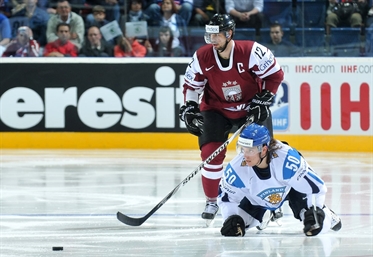Home not equal to the heart
Home not equal to the heart
Latvia Olympian enjoying life in Germany

 Veteran forward Herberts Vasiljevs, pictured against Finland's Juhamatti Aaltonen, returns to the Latvian national team for the Olympics. Photo: Matthew Manor / HHOF-IIHF Images
Veteran forward Herberts Vasiljevs, pictured against Finland's Juhamatti Aaltonen, returns to the Latvian national team for the Olympics. Photo: Matthew Manor / HHOF-IIHF Images
The Latvian-born, German-naturalised veteran forward knows each feeling well, having experienced both in his career.
“It’s a once in a lifetime opportunity”, an enthusiastic young Vasiljevs responded when he learned that Latvia had qualified for the 2002 Salt Lake City Olympics. Prior to then, Latvia last played hockey at the Olympics in 1936. Five years later, the Soviet Union invaded the country, and Latvians played under the Soviet flag until regaining their independence in 1991.
The only thing that could stop Vasiljevs, who was playing in the AHL with the Manitoba Moose at the time, from becoming an Olympian was a call-up by the Vancouver Canucks.
At least that’s what he thought.
It wasn’t an unexpected call-up but rather an injury that sidelined him during the tournament and ruined what was supposed to be Vasiljevs’ greatest moment of his life. Looking back at what happened a decade ago, the forward is still a bit sour.
“It was and still is a huge disappointment which really upset me. Luckily I was able to make up for it by participating in the Torino and Vancouver Olympic games.”
After playing for Latvia in the 2011 World Championship, he gained German citizenship and hasn’t represented any national team since. But in Sochi he will be back for Latvia.
His choice of playing in Germany is not as far fetched as it might look. Not only has the Krefeld Pinguine player been playing in the DEL since the 2004/2005 season, but he also grew up in the county where his father, Haralds, was coaching the Krefeld juniors.
The story of him growing up as a hockey player is one of many whose father is a former player or coach.
“I consider it a big plus and not because people know who my father is. It’s what I could learn from him and what he gave me. I’ve been surrounded with hockey all my life and that helped me in my career,” he says. “My father was extra harsh on me and I was far from happy about that at the time but when you get older you understand why he was pushing so hard that he was not always as unhappy as it felt at the time.”
At the age of 19, he waved goodbye to his parents and crossed the ocean for a North American adventure. A difficult step to take for some, but not so for Vasiljevs.
“When you are young you want to experience and explore new things to become the best you can be. All the difficulties you might come across are not so much considered a bother at that time,” he remembers. “For me it was a great choice that I made. I left on my own to play junior hockey in Guelph, Canada and I had to learn a new language, new style of hockey and life. I really enjoyed it.”
Vasiljevs talks in fluent English, while switching to German and Russian from time to time when a teammate passed by during the interview.
For a former Soviet Union native who lists Sergei Makarov as his childhood idol, a return to Russian hockey would not have looked out of place. But Vasiljevs played just a single season in Russia and looks back on it as an “interesting experience” and something completely different to adjust to compared to hockey in North American. Of all possible Russian league club teams, the forward donned the jersey of Amur Khabarovsk, located in the far east of the country.
“I’ve never played in such conditions as that season,” he remembers. “The colds were not new to me as I played in Manitoba for two seasons but the flying really did it to me. Never in my career did I see a team fly so much to play hockey. I have to give a huge heads up for the fans and players who really love their team.”
After a single season in Russia, he moved back to Germany where he would continue to play until today. Vasiljevs therefore never played pro hockey in his homeland Latvia. Is it something he regrets?
“Like nearly all players on the national team I have been playing in Europe and North America. The reason is simple: The club level was not too high in Latvia at the time while I was lucky enough to be given better opportunities in Canada,” says Vasiljevs who is settled now in Krefeld.
“If there would have been a KHL with Dinamo Riga a decade ago, I’d have signed for them in a heartbeat,” he confesses. “I did receive offers in the past but then there wasn’t a KHL nor a great Riga Arena yet.”
For Vasiljevs, the introduction of Dinamo Riga in the KHL is a blessing for the fans and good for Latvian hockey. “Latvian hockey is doing well and is taking steps in the right direction. We’re a small country but our U20 and U18 play at the top level regularly which is certainly a big achievement for Latvia.”
In ever international tournament it participates in, the Latvian national team is supported by and is known for its huge share of noisy fans. Although no longer playing for the national team Vasiljevs has nothing but praise for them, though feels the existence of a KHL team is having some effects on the national team support.
“The fans are great and used to be even crazier before Dinamo Riga entered the KHL. Before, the national team was the only thing that mattered for Latvian hockey fans. Wherever we were playing, they were there and the fans often outcheered the local fans.”
With age slowly but surely creeping in on him, the 36-year-old has no plans to quit the game. After an injury ravaged 2011/2012 season, Vasiljevs has returned feeling rejuvenated and among one of the best scorers of his team.
“I’ll remain playing for as long as I see my body stays healthy. I still love the dressing room atmosphere and being on the ice for practice and games. Once you stop there’s no way back into the game any more.”
Prolonging his career as a coach or manager, and stepping into his father’s footsteps, doesn’t seem to be that unlikely, but is something for the future. Asked if he envisions himself taking duties behind the bench in Riga, Vasiljevs is rather outspoken.
Back to Overview











































